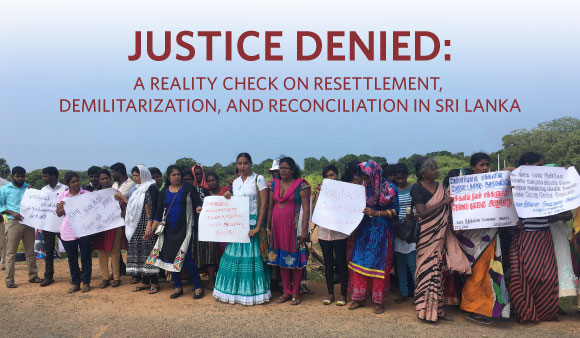Justice Denied: Government and International Community Fail to Bring Justice to Sri Lanka
For the past two months, protests have erupted across Sri Lanka’s North and East. Communities have launched rolling hunger strikes, insisting that their land be returned. Relatives of the missing have held sit-ins, demanding answers about their loved ones fates and whereabouts. And in numerous cities and towns people have marched, calling for the creation of a court with international judges to prosecute war crimes committed during the civil war.

Many of these protesters had strong hopes and expectations from the UN Human Rights Council’s 34th session, which wraps up this week in Geneva. On the agenda was a comprehensive report and discussion about progress made under UN Resolution 30/1, “Promoting reconciliation, accountability, and human rights in Sri Lanka.”
The Sri Lankan government’s co-sponsorship of Resolution 30/1 in October 2015 was seen as an important move. Among the many things it calls for are the return of land to internally displaced persons (IDPs), the demilitarization of the North and East, the repeal of the notorious Prevention of Terrorism Act, and the establishment of four vital mechanisms for transitional justice, including a war crimes court. Sadly, progress on all accounts has been painfully slow and huge problems persist in the country, making the HRC session more important than ever.
Justice Denied, the latest report from the Oakland Institute on Sri Lanka, released on March 20, paints a dismal picture of resettlement, demilitarization, and reconciliation in the country.
Resettlement & Demilitarization Eluded
Regarding land, the few actions made by the government since Resolution 30/1 passed were overshadowed by the immense problems that continue to plague tens of thousands of IDPs in the country. Significant quantities of land continue to be occupied by the military and are used for dubious purposes, like running tourist resorts; there is a vast and unmet need for housing and infrastructure for the displaced; and ever-changing timelines for resettlement have bred mistrust in the government.
Even when land is released, massive issues regarding resettlement remain, including the high cost of clearing land to re-establish homes, livelihoods, and vital infrastructure. As one former IDP told me last week:
“Even though [the] government release[d] my village partially, our people are struggling a lot to go back. … Land clearing work consum[es] a huge amount of money. Simply [put], our politicians and government officers neglect our present obstacles. [A] few of our relatives [have] borrow[ed] loans locally [at] high interest [rates] and do their land clearing and developing work. But most of our villagers [are] struggling a lot [and] don’t know how to go ahead.”
Resolution 30/1 also contains important provisions on the demilitarization of the North and East. But, as Justice Denied shows, the country’s military budget has more than doubled since the end of the war, raising serious questions about the intent and ability of the Sri Lankan government to demilitarize these regions.
Sri Lankan Government Fails on Promises of Reconciliation
Progress towards the country’s reconciliation objectives has also been bleak. War crimes — including numerous alleged cases of rape, torture, kidnapping, and mass killing — have gone unpunished. The government has backtracked on its promise to include international judges and legal experts in a war crimes court. Torture is routinely practiced in the country, thanks in large part to a continuing culture of impunity. The notorious Prevention of Terrorism Act is still in force. The outcomes of national consultations on reconciliation have been ignored. The National Authority for Victim and Witness Protection includes alleged perpetrators of torture. And tens of thousands remain unaccounted since the end of the war, with tens of thousands more displaced, and over one hundred thousand continuing to live as refugees in India.
This amounts to a complete failure of the Sri Lankan government to uphold its commitments.
Lackluster Outcomes from the UNHRC’s 34th Session
So what came out of the HRC session?
On the positive side, numerous reports by a wide range of civil society organizations1 and special mandate holders,2 as well as the UN High Commissioner for Human Rights, have confirmed the horrendous situation, dragging these issues into the limelight and increasing international attention and pressure for action in Sri Lanka.
But the outcomes of the meeting itself are devastating for war victims and advocates for justice. A new resolution — again co-sponsored by Sri Lanka — passed on March 23, giving the government an additional two years to show progress on Resolution 30/1. In a best case scenario, this extension will delay justice for tens of thousands of people. But, as demonstrated by the laundry list of failures and inaction by the government noted above, political will in Sri Lanka appears to be virtually non-existent. In addition, the new resolution contains no clear timetable or strategy for follow-through on the commitments contained in Resolution 30/1. This means there are no guarantees that any progress will be made in the ensuing two years — or known consequences for inaction. Given the lack of progress made over the last 18 months, what’s to say that an extension of time will bring justice?
We Must Do Better
Eight years since the end of the war, tens of thousands continue to be displaced; alleged war criminals operate freely in the country, some holding positions of power; and mothers, fathers, brothers, and sisters still await news of the fate of their loved ones.
Justice has been denied for far too long for the communities that are living in the shadows of Sri Lanka’s civil war. We must do better.
Footnotes
- [1] These include reports by the International Truth and Justice Project; People for Equality and Relief in Lanka; and the Sri Lanka Monitoring and Accountability Panel, amongst others.
- [2] This includes a report by the UN Special Rapporteur on Minority Issues and the UN Special Rapporteur on Torture and Other Cruel, Inhuman, or Degrading Treatment or Punishment.
